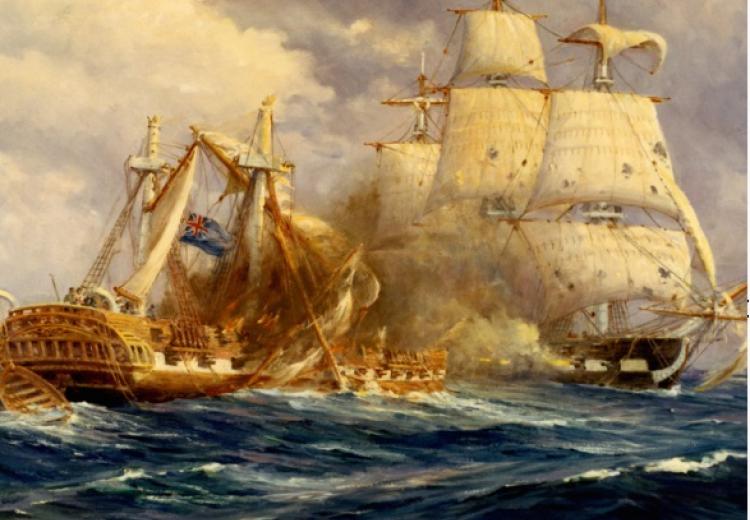President Madison's 1812 War Message

Painting by Anton Otto Fischer depicting the first victory at sea by USS Constitution over HMS Guerriere.
"Whether the United States shall continue passive under these … accumulating wrongs, or, opposing force to force in defense of their national rights, shall commit a just cause into the hands of the Almighty Disposer of Events, … is a solemn question which the Constitution wisely confides to the legislative department of the Government. In recommending it to their early deliberations I am happy in the assurance that the decision will be worthy the enlightened and patriotic councils of a virtuous, a free, and a powerful nation."
—President James Madison, War Message to Congress Washington
June 1, 1812
According to the essay James Madison, 'Creating the Balance' on the EDSITEment resource The American President, "Madison's presidency was dominated by a crisis with Great Britain, which for years had been grossly violating American shipping rights." This crisis over U.S. shipping rights actually began while George Washington was president and grew during Thomas Jefferson's term in office (1800-1808), when Madison served as Secretary of State. Between 1805-07, a large number of American ships were seized and impressments of American sailors into service on British ships increased, leading Congress to pass an extreme measure, the Embargo Act of 1807. The act restricted trade with foreign nations. A state of war that began in 1803 and would continue until after Napoleon's abdication in 1814 resulted in a loss of commerce that devastated the American economy while doing little to change the policies of France and Britain.
Abuses to American commerce on the part of Britain and France continued. But in 1810 Napoleon's announcement that France would no longer seize American ships convinced President Madison to allow trade with France. The announcement had conditions attached, and France continued to interfere with American shipping. In the end, however, the U.S. declared war only on Great Britain.
The decision to go to war is one of the most serious an American president faces. On June 1, 1812, President Madison sent a letter—later dubbed his war message—to both houses of Congress. In it, he listed a series of transgressions Great Britain had committed against the U.S. He also explained his decision not to recommend war with France at that time. EDSITEment resources offer primary documents that illuminate key points in President Madison's War Message. Help your students understand the reasons the president gave for going to war, while heightening their appreciation of the value of archival sources.
Guiding Questions
How did Madison build the case for war in his message to Congress?
What did the maritime disputes between the U.S. and Great Britain entail?
What were the accusations against the British in North America?
Why did Madison not include a specific declaration of war in his remarks?
Why did Madison want to avoid war with France?
Was the War of 1812 an extension of the American Revolution?
Learning Objectives
Analyze the rhetorical devices employed by President Madison to justify his case against the British.
Cite important examples of insults to American maritime rights and explain the ways in which they were troubling to the U.S.
Evaluate the competing arguments forwarded by the U.S. and British regarding their maritime disputes.
Analyze primary sources to inform a point of view analysis of those Americans who made accusations against the British.
Evaluate Madison's rationale for delaying war with France.
